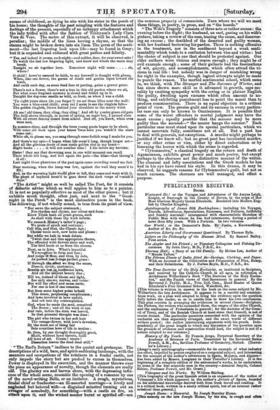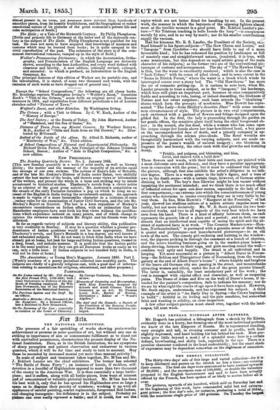PUBLICATIONS RECEIVED.
BOOBS.
Westward ! or the Voyages and Adventures of Sir Amyas Leigh, Knight, of Burrough in the County of Devon, in the reign of Her Most Glorious Majesty Queen Elizabeth. Rendered into Modern Eng- lish by Charles Kingsley.
Autobiography of James Silk Buckingham; including his Voyages, Travels, Adventures, Speculations, Successes, and Failures, faithfully and frankly narrated : interspersed with characteristic Sketches of-. Public Men with whom he has had intercourse, during a period-of mere than fifty years. With a Portrait. In two volumes.
Our World; or the Democrat's Rule. BY- Jude, a Knownothing,
Author of &c. &c. &c. -
American Liberty and Government Questioned. By Thomas Ryle. Letters on the Philosophy of the Human Hind. By Samuel Bailey. First series.
The Angler and his Friend ; or Placatory Colloquies and Fishing Ex- cursions. By John Davy, ALD„ &c. i'horney Hall; a Story of an Old Family. By Holum Lee, Author of "Maude Talbot."
The Fibrous Plants of India fitted ism thrdaye, Clothing, and Paper. With an Account of the Cultivation and Preparation of Flax, Hemp, and their Substitutes. By J. Forbes Reyle, F.R.S., &c.
The True Doctrine of the Holy Eucharist, as instituted in Scripture, and received by the Catholic Church in all ages, in refutation of Archdeacon Wilberforce's Book "The Doctrine of the Holy Eucha- rist," and the Popish views of that Sacrament in general. By the Reverend J. Taylor, M.A., Trin, Coll. Cam., Head Master of Queen Elizabeth's Free Grammar School, Wakefield, &c. [This volume is written in answer to the book on the same subject by )Mr.. Wilberforce the late Archdeacon. It appears to be a careful and conscien- tious work, on a plan well adapted to bring the evidence upon the question fully before the reader, so as to enable him to draw his own conclusions. This plan consists in arranging the evidences in several classes—Scripture, the Fathers, the writers who succeeded them, the usages of the older Church, and the confessions of Protestants in general; for the doctrine of the Cotin• cil of Trent, and of the Romish Church at least since that Council, is not of course denied. The particular questions connected with the opinion of the eucharist are then separately arranged, and the exact words of different writers quoted ; the author Intermixing arguments with his proofs. Inde- pendently of the great length to which any diacwision of the question upon the grounds of evidence and construction would lead, the subject is not of a nature adapted to our columns.] History of My Youth. By Francis Arago, Perpetual Secretary of the Academy of Sciences of Paris. Translated by the Reverend Baden, Powell, A.M., &c., Savilian Professor of Geometry, Oxford. (Travel- ler's Library.)
[Arago'a early autobiography—memorable for its example of what industry can effect, impelled by genius employed on a congenial subject, and interesting. for the account of the author's adventures in Spain, Majorca, and Algiers— has been added by Messrs. Longman to their Traveller's Library. It is the beginning of a complete edition of the astronomer's works, to be undertaken by some of the first scientific men in the country—Admiral Smyth, Colonel Sabine, Professor Powell, and Mr. Grant.]
Velasguez and his Works. By William Stirling. [This biography of the great Spanish artist is an expansion of the notice of Velasquez's life which appeared in the author's Artists ofkfpain founded on his additional knowledge derived both from fresh travel and reading. It is a critical book, written in a nicely critical spirit, but of an interest rather artistical than geaeraL] Joseph Hume : a Memorial. By Joseph Burnley Hume. [This monody on the late Joseph Huine, by his son, is-cough and oftett
filmset prosaic in its verse, yet possesses more interest than hunch eds of smoother pieces from its homely truthfulness, and the biographical or rather aneedotiml nature of its pictures of the great economist's private life and calm anticipation of death.] The Exile ; or a Tale of the Sixteenth Century. By Philip Phosphorus. [Noble and princely life in Germany at the latter end of the sixteenth cen- tury ia the subject of The Exile. Philip Phosphorus is not qualified for his task. He does not seem to have acquired that knowledge of manners and- customs which may be learned from books ; he is quite unequal to the vivid reproduction of the past. The substance of the story is of the com- monest conventional romance, vamped up in the style of Scott.] Walker's Pronouncing Dictionary; in which the Accentuation, Ortho- graphy, and Pronunciation of the English Language are distinctly shown according to the best Authorities, and every word defined with clearness and brevity. A new edition, critically revised, enlarged, and amended : to which is prefixed, an Introduction to the English Grammar, 8ic.
[The principal features of this edition of Walker are its portable size, and the introduction, it is stated, of some two thousand new words, with the omission of such words as have dropped out of general use.] Except the "School Compendium," the following are all cheap books. Mr. Routledge reprints Washington Irving's "Wolfer-i's Roost," translates Koch'e "Visit to the Crimea,' sends forth an original novel on Russian manners in 1854. ad republishes from different periodicals a lot of London sketches called "Pictures of Town."
Wolfert's Roast, and other Sketches. By Washington Irving.
The Crimea, with a Visit to Odessa. By C. W. Koch, Author of the "History of Europe."
The Serf Sisters; or the Russia of Today. By John. Harwood, Author of "Stamboul, and the Sea of Gems," &e.
Picturee of Town from my .Mental Camera. By Werdner Retnyw, M.D., Author of "Odds and Ends from an Old Drawer," &c. Illus- trated by Id‘Connell.
Ballad of the Battle of the Alma. By Alfred B. Richards, author of "Minstrelsy of War,' &c. Third edition.
A School Compendium of Natural and Experimental Philosophy. By Richard Green Parker, A.M., late Principal of the Johnson Grammar School, Boston ; Author of "Aids to English Composition," &c. A new edition.
Nsw PERIODICALS.
The Bombay Quarterly Review. No. L January 1856.
[This new Bombay quarterly is a work of solid merit, as well as literary ability ; the matter and the manner of the majority of its articles equal the average of our own reviews. The notices of Kaye's Life of Metcalfe, and of the late Mr. Erakine's History of India under Baber, very skilfully extract the best matter of the books, add thereto some views or information orthe writers, and present the whole in a terse and striking way by minds accustomed to historical studies. Thackeray's novels form a clever notice by an admirer of the great prose satirist ; Mr. Anderson's compilation on the annals of the early Factories furnishes a peg en which to hang an ac- count of the English in India during the seventeenth century. An approach is made to topics of a more businesslike character in a criticism of some 2ambay rules for the examination of Junior Civil Servants, and the late Mr. Mackay's Report on Guzerat The last is a keen exposition of Mackay's unconscious oneaidedness on Indian affairs, with an intimation that his Manchester employers have sent forth his first views without the qualifica- tions which experience induced on many points, and of which change in opinion the reviewer seems to think Mr. Bright and his friends were fully informed.
So far as regards variety of subjects and literary ability, this publication is very creditable to Bombay. It may be a question whether a greater pre- dominance of Indian questions would not be more appropriate. Baber, Thackeray's novels, and Kaye's Metcalfe in a less degree are well known if not exhausted subjects. We do not want to fetch from India what we have already got at home, but look for large and living Indian questions, treated in a deep, broad, and catholic manner. It is probable that the Indian public is in the same position ; for they can get all European works as easily as we can, only a little later. If Indian subjects be not handled fully in India, it will not be done at home.] The Association, or Young Men's Magazine. January 1855. Part I. [Weekly numbers of a penny periodical collected into monthly parts. The subjects are chiefly of a gravely religious cast, with a good deal of informa- tion relating to associations for religious, educational, and other purposes.]
PAMPHLETS.
On the LOWS& raised by 'Mr. Pitt during By George Cochrane, Esq., Barrister- ffie first French War, 1793-1801; with at-law.
some Statements in Defence of the me- thods of Funding employed. By Wil- liam Newmarch, one of the Honorary Secretaries of the Statistical Society.
The Purchase System and the Ste. By an Officer.
Australia a Mistake : New Brunswick for the Emigrant. By a Retired Officer, late a Resident In New Brunswick.
On the Economy of the Law; especially in relation to the Court of Chancery. Elements of Geometry and Mensuration; with Easy Exercises, designed for Schools and Adult Classes. Part II. Geometry as an Art. By Thomas Lund, B.D., Rector of Morton, Derbyshire ; Editor of " Wood's Algebra."
The Serf and the Cossack; a Sketch of the Condition of the Russian People. By Francis Marx. Second edition, en- larged.



























 Previous page
Previous page